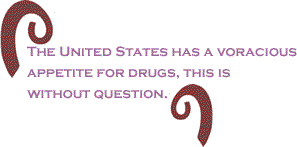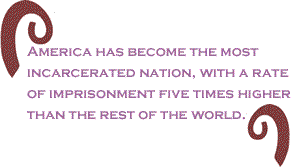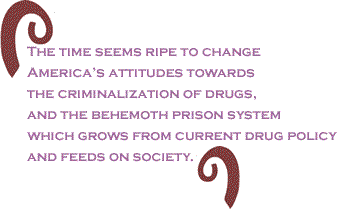
|
|||||||||||||||||||||||

|
|

Custom Search
|
|
 |
|
The following is the fourth part of an ongoing Color of Law series. Click here to read any of the commentaries in this series. In a recent online town hall meeting at the White House, President Obama was asked by the online audience whether he thought legalizing marijuana would create jobs and help the economy. It was the most popular question asked at the meeting. “I don’t know what this says about the online audience,” Obama remarked, then adding, “No, I don’t think this would be a good strategy.” He seemed to give a little chuckle, as did the extras who were cast as audience members in the background behind the president. But this is no laughing matter, and America’s failed war on drugs is serious business. Dead serious, in a literal sense. The United States has a voracious appetite for drugs, this is without question. Over the years - in a move tinged partly with greed, partly with boneheadedness and shortsightedness, and partly with racism - the nation has treated drugs as an issue of morality and criminal justice. As a result of this war on drugs, poor communities and communities of color have been decimated. Rather than target the places where most of the drugs are consumed - in the White suburbs, middle-class areas and wealthy enclaves - law enforcement targets the areas where drug sales and drug use are most conspicuous: the inner city. As a result, 1 in 99 adults is behind bars, including 1 in 36 Latino adults, 1 in 15 Black adults, and 1 in 9 African Americans between the ages of 20 and 34. Yes, I said 1 in 9. Generations are spending their most formidable years in prison over drugs, sometimes most of their lives, when they should be raising their families, contributing to society, getting an education, what have you. Like the effects of the Vietnam War, the damage visited upon these communities by the drug war is irreparable. America has become the most incarcerated nation, with a rate of imprisonment five times higher than the rest of the world. The effects of these harsh punitive policies, and the criminalization of drugs, have implications beyond the borders of this country. Mexican drug cartels, meeting America’s drug demand, are wreaking havoc on Mexico. That country is in trouble, big trouble. Over 1,100 people have been killed in drug-related violence in Mexico so far this year (6,200 in 2008), due in no small measure to the use of American firearms. Decapitations, kidnappings, torture, the use of hand grenades, and murders with military-style assault weapons are standard fare. And this crisis is spilling over into the United States.
Although America’s weapons policy has created the carnage in Mexico, the Obama administration will face formidable opposition from the gun lobby if it tries to ban assault weapons. Don’t get me started with the Second Amendment and the so-called right to bear arms. This farce represents a vehicle by which arms manufacturers hide behind bogus and dishonest interpretations of the U.S. Constitution, and get rich by profiting from human bloodshed. No good comes from the proliferation of these weapons of mass destruction. Poverty in Mexico is the context by which drug cartels gain their recruitment foothold. I suppose that NAFTA, with its empty hopes of prosperity, did not work out as well as some people envisioned it. With poverty fueling the drug trade in Mexico, and America’s appetite for drugs creating the demand, is it really any different from poor people in the U.S. who are lured to the drug trade? I speak of people in this country who lack economic and educational opportunities and are lured by a materialistic culture that tells them to obtain money by any means, without regard for the consequences and who is harmed. You know, kind of like Wall Street executives.
These days, the economic crisis, failed drug policy and failed criminal justice policy threaten to intersect in the form of demands for drug decriminalization, particularly the legalization and regulation of marijuana. I wonder what took so long. Already, legislation has been introduced in the California state assembly to legalize the cultivation, possession and sale of marijuana and tax the $14 billion annual crop. Such a move could allow California - a state that cannot afford to pay its state employees amid a budget crisis, spends more on prisons than on public universities, and has been ordered to set one-third of its prisoners free due to overcrowding - to potentially rake in billions of dollars in desperately needed revenue. Prohibition did not work, and fuelled gangsterism in the U.S. Now, alcohol is legal, and some states regulate alcohol through taxation or by selling through state controlled stores.
In light of this reality, Senator William Webb (D-VA) has introduced a bill called the National Criminal Justice Commission Act of 2009. The legislation provides for a commission to review the entire criminal justice system (state and federal), and make recommendations regarding the reform of incarceration policy and drug policy, among other things. We do not know what will become of the senator’s legislation, but we do know that the current ways are unsustainable. And the definition of insanity is doing the same thing over and over and expecting different results. Click here to read any of the commentaries in this series. BlackCommentator.com Editorial Board member David A. Love, JD is a lawyer and journalist based in Philadelphia, and a contributor to the Progressive Media Project, McClatchy-Tribune News Service, In These Times and Philadelphia Independent Media Center. He contributed to the book, States of Confinement: Policing, Detention, and Prisons (St. Martin's Press, 2000). Love is a former Amnesty International UK spokesperson, organized the first national police brutality conference as a staff member with the Center for Constitutional Rights, and served as a law clerk to two Black federal judges. His blog is davidalove.com. Click here to contact Mr. Love. |
|
Any BlackCommentator.com article may be re-printed so long as it is re-printed in its entirety and full credit given to the author and www.BlackCommentator.com. If the re-print is on the Internet we additionally request a link back to the original piece on our Website. Your comments are always welcome. eMail re-print notice
If you send us an eMail message we may publish all or part of it, unless you tell us it is not for publication. You may also request that we withhold your name. Thank you very much for your readership. |
|
| |
|
| April
2 , 2009 Issue 318 |
|
| Executive Editor: Bill Fletcher, Jr. |
| Managing Editor: Nancy Littlefield |
| Publisher: Peter Gamble |
| Est. April 5, 2002 |
Printer Friendly Version
in resizeable plain
text format or pdf
format. |
| Frequently Asked Questions |
 |

|
 |
 |
 |
| |
| |





































